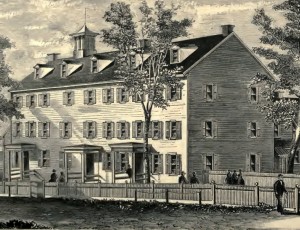 On Thanksgiving day in November 1863 two children whose fathers were killed during the Civil War went to the executive mansion in Harrisburg, Pennsylvania and asked for food. Apparently this experience inspired Governor Andrew Curtin to ask the Pennsylvania legislature to establish an organization to care for orphans of Union soldiers. While legislators did not appropriate the necessary funds, they accepted a private donation to set up an institution whose mission was “the education and maintenance of destitute orphan children of deceased soldiers and sailors.” Children remained in the system until age sixteen – for example, see this list of “Sixteeners” who left in 1877. Schools were set up in communities across the state, including the White Hall School in Camp Hill. Professor David Denlinger opened the school in May 1866, but he quickly ran into trouble. As “the building was…unsuitable for a school of this kind,” James Laughery Paul explains that that “typhoid fever prevailed to an alarming extent in the fall of 1867 and quite a number of deaths occurred.” While the school closed in 1890, alumni returned to Camp Hill in 1926 and dedicated a monument in Willow Park (located at intersection of 24th & Walnut Streets). You can learn more about the organization in James Laughery Paul’s Pennsylvania’s Soldiers’ Orphan Schools (1876), the 1877 and 1909 Annual Report of the Superintendent of Soldiers’ Orphans, and William Henry Egle’s Andrew Gregg Curtin: His Life And Services (1895).
On Thanksgiving day in November 1863 two children whose fathers were killed during the Civil War went to the executive mansion in Harrisburg, Pennsylvania and asked for food. Apparently this experience inspired Governor Andrew Curtin to ask the Pennsylvania legislature to establish an organization to care for orphans of Union soldiers. While legislators did not appropriate the necessary funds, they accepted a private donation to set up an institution whose mission was “the education and maintenance of destitute orphan children of deceased soldiers and sailors.” Children remained in the system until age sixteen – for example, see this list of “Sixteeners” who left in 1877. Schools were set up in communities across the state, including the White Hall School in Camp Hill. Professor David Denlinger opened the school in May 1866, but he quickly ran into trouble. As “the building was…unsuitable for a school of this kind,” James Laughery Paul explains that that “typhoid fever prevailed to an alarming extent in the fall of 1867 and quite a number of deaths occurred.” While the school closed in 1890, alumni returned to Camp Hill in 1926 and dedicated a monument in Willow Park (located at intersection of 24th & Walnut Streets). You can learn more about the organization in James Laughery Paul’s Pennsylvania’s Soldiers’ Orphan Schools (1876), the 1877 and 1909 Annual Report of the Superintendent of Soldiers’ Orphans, and William Henry Egle’s Andrew Gregg Curtin: His Life And Services (1895).
29
Sep
10








Related Articles
No user responded in this post
Leave A Reply
Please Note: Comment moderation maybe active so there is no need to resubmit your comments